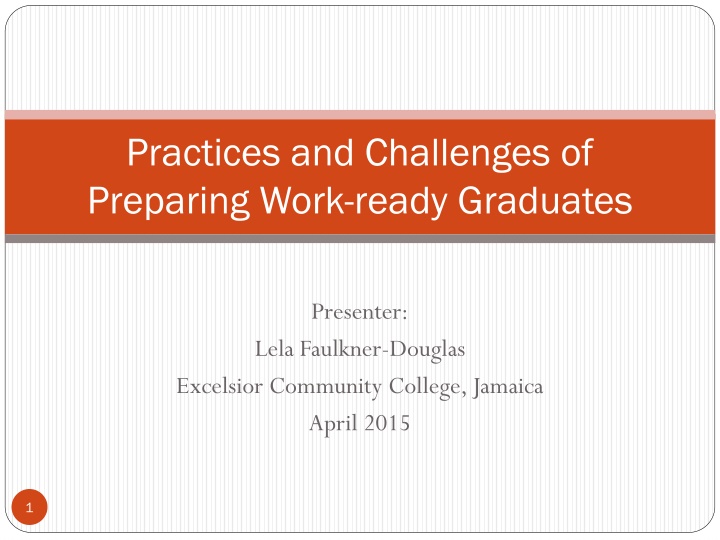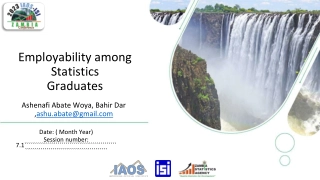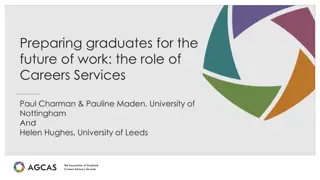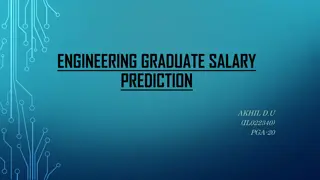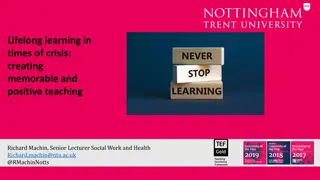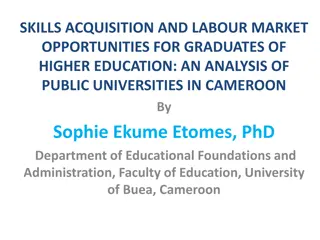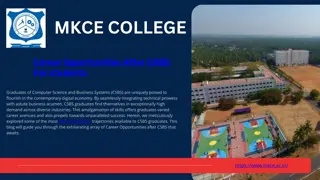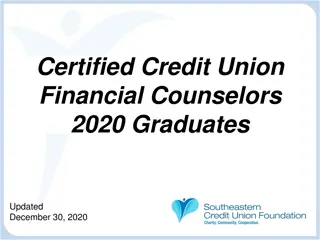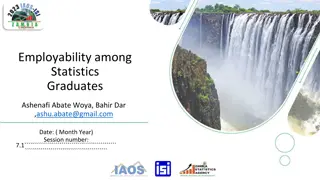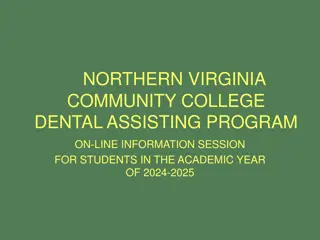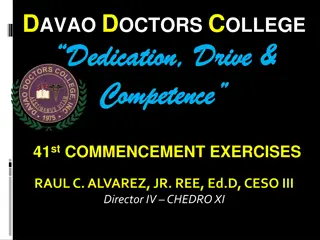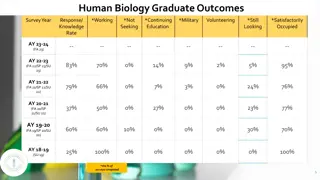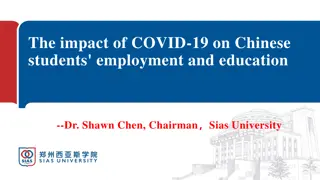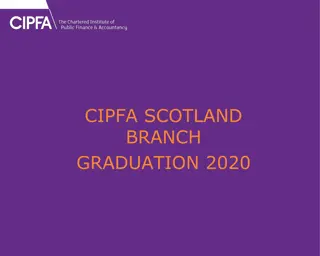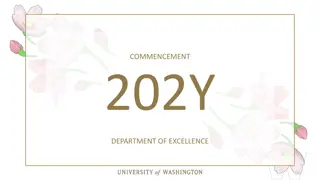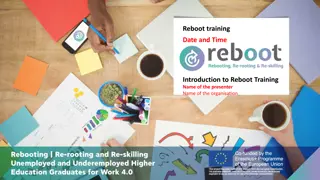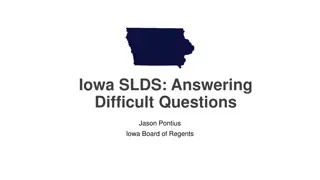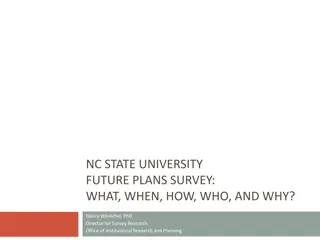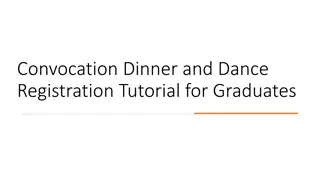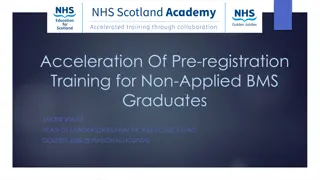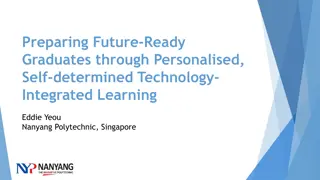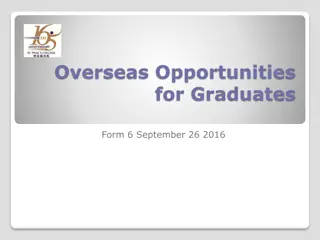Practices and Challenges of Preparing Work-ready Graduates
Globalization and technology have transformed the modern workplace, requiring graduates to possess a mix of technical and non-technical skills. This study focuses on a Jamaican community college's approach to developing work-ready graduates by examining teaching practices, industry involvement, and challenges faced by educators.
Download Presentation

Please find below an Image/Link to download the presentation.
The content on the website is provided AS IS for your information and personal use only. It may not be sold, licensed, or shared on other websites without obtaining consent from the author.If you encounter any issues during the download, it is possible that the publisher has removed the file from their server.
You are allowed to download the files provided on this website for personal or commercial use, subject to the condition that they are used lawfully. All files are the property of their respective owners.
The content on the website is provided AS IS for your information and personal use only. It may not be sold, licensed, or shared on other websites without obtaining consent from the author.
E N D
Presentation Transcript
Practices and Challenges of Preparing Work-ready Graduates Presenter: Lela Faulkner-Douglas Excelsior Community College, Jamaica April 2015 1
Introduction Introduction Globalisation and the pervasiveness of technology are powerful forces affecting the twenty-first century workplace. Businesses, educational institutions and individuals are faced with new realities. 2
Introduction Introduction It takes more than a degree to compete in the present volatile labour market. Businesses are interested in individuals who can add immediate value to their organisation and therefore demand graduates who are work-ready. 3
Introduction Introduction Technical and non-technical skills are deemed necessary for work-readiness. Employers are dissatisfied with the quality of graduates entering the world of work (Wilton, 2012). 4
Introduction Introduction Statement of the Problem A number of studies explored the expectations of twenty-first century graduates. Not much empirical studies on the workforce readiness of community college graduates in Jamaica. This study is designed to look at a community college approach to preparing work-ready graduates. 5
Introduction Introduction Purpose of the Study The purpose of this study was to explore the practices of educators in a Jamaican community college in preparing students for the workforce. A discussion of teaching and learning practices, curriculum evaluation and review practices and industry participation is presented. An insight into the challenges encountered by the institution in preparing students was also examined. 6
Introduction Introduction Research Questions 1. What are the teaching and learning activities engaged in by lecturers in preparing students for the workforce? 2. What is the level of industry participation in the curriculum development and implementation? 3. What are the challenges faced by educators in ensuring work-ready graduates? 7
Review of Literature Review of Literature Identifying work-readiness Work-readiness is defined as possession of skills, knowledge, attitudes and commercial understanding that will enable new graduates to make productive contribution to organisational objectives soon after commencing employment (Mason, et. Al, 2009; p.1). 8
Review of Literature Review of Literature Identifying work-ready skills cont d Both technical and non-technical skills are required to produce work-ready graduates (Jackson, 2013). Non-technical, generic, core, professional, key or work-ready skills are all terms used interchangeably with employability skills (Yorke & Knight, 2004, cited in Jackson, 2013). 9
Review of Literature Review of Literature Problem-solving and Critical Thinking Research Self-Management and Lifelong Learning Team-work and Leadership Technology Literacy (Litchfield, Nettleton & Taylor 2008; Lowden, Hall, Elliot & Lewin, 2011) Work-ready skills and attributes Communication Ethics and Professionalism Global and Local Perspectives Information Literacy and Management Initiative, Enterprise and Creativity Planning and Organising 10
Review of Literature Review of Literature Employers Perspectives of work-ready graduates Technical skills are easier to teach on the job, hence they prefer graduates being very proficient in generic skills (Litchfield, Nettleton & Taylor, 2008) Graduate employees are inadequately prepared for entry level work (Cabellero & Walker, 2010) 11
Review of Literature Review of Literature The gap in the skills that employers demand and what the graduates possess can cause reduced productivity and lead to underperformance in the organization. (Jackson, 2013). The responsibility of ensuring graduates acquire the relevant non-technical skills remains with the school (Hancock, Howieson, Kavanagh, Kent, Tempone & Segal, 2009; as cited in Jackson, 2013). 12
Literature Review Literature Review Graduates attributes cannot be adequately assessed until students enter the workforce (Nagarajan & Edwards, 2014). 13
Literature Review Literature Review Higher Education Institutions Practices in Preparing Work-ready graduates The use of technological tools actively engage students in the learning process and enhances creativity (Bhaumik, 2012; Bassendowki & Petruka, 2013; Bell, 2010). 14
Literature Literature Review Review Project-Based Learning allows students to apply their knowledge through a project (Bell, 2010) PBL is aimed at promoting active learning among students, catering to students with different learning styles ( Pinho- Lopez & Macedo, 2014) PBL has significant impact on students employability and professional success (Pinho-Lopez & Macedo, 2014). 15
Review of Literature Review of Literature Work Integrated Learning exposes students to real life situations relating to their area of study (Smith, 2012) WIL has proven highly beneficial in developing employability skills (Freudenberg, Brimble & Cameron, 2010; Mason, Williams & Cranmer, 2009). 16
Methodology Methodology A qualitative design was utilized Data were collected using semi-structured interviews Purposive sampling was used to select participants Sample consisted of nine educators lecturers and persons with special responsibilities 17
Findings Findings Research Question 1: What are the teaching and learning activities engaged in by lecturers in preparing students for the workforce? Instructional Approach and Activities Both traditional and contemporary approaches are utilized. 18
Findings Findings Research Question 1 Cont d: Traditional Methods include: Lectures Discussion and questioning Role play Group work and oral presentations Note-taking Guided discovery 19
Findings Findings Research Question 1 Cont d: Modern technological tools were used to support traditional approaches. They include: Virtual Learning Environment (Moodle) PowerPoint Web 2.0 tools Emails Social media 20
Findings Findings Research Question 1 Cont d Assessment Methods Weighed heavily on tests and exams 60/40 rating for most courses Project based learning 21
Findings Findings Research Question 2: What is the level of industry participation in the curriculum development and implementation? Industry Participation Curriculum review and evaluation Board of studies Work experience programme Guest and Adjunct Lecturers Industry practitioners as evaluators and resource persons to students 22
Findings Findings Research Question 2 Cont d Feedback from industry had both positive and negative elements Students technical skills were satisfactory Generic and soft skills were deficient (Jackson & Chapman, 2012). 23
Findings Findings Research Question 3: What are the challenges faced by educators in ensuring work-ready graduates? Challenges encountered by Educators Students characteristics and SES Curricula content overload, overlapping and obsoleteness Limited resources and motivation 24
Conclusion Conclusion Preparing work ready graduates is a collaborative effort between higher education institutions and relevant industries. Despite the number of programmes embarked on, developing generic and soft skills is extremely challenging. Industry practices tend to change frequently as such, more timely curricula changes needed. 25
Recommendations Recommendations Improved developmental programmes to assist students in developing soft skills Increased work-based learning On-going training and motivation for staff Effective mentorship programmes for students More project-based learning and performance-based assessments 26
References References Bassendowski, S. L & Petrucka, P. (2013). Are 20th-century methods of teaching applicable in the 21st century? British Journal of Educational Technology, 44(4), 665-667 Bhaumik, P. K. (2012). Use of ICT in the Classroom Teaching of Management.Vision(09722629),16(4), 245-252. doi:10.1177/0972262912460180 Bell, S. (2010). Project-Based Learning for the 21st Century: Skills for the Future. Clearing House, 83(2). 39-43 Cabellero, C. L., & Walker, A. (2010). Work readiness in graduate recruitment and selection: a review of current assessment methods.Journal of teaching and learning for graduate employability,1(1), 13-25. 28
References References Jackson, D. (2013). Business graduate employability where are we going wrong?.Higher Education Research & Development,32(5), 776-790. Jackson, D., & Chapman, E. (2012). Non-technical skill gaps in Australian business graduates.Education+ Training,54(2/3), 95-113 Litchfield, A. J., Nettleton, S. C., & Taylor, T. L. (2008). Integrating work-ready learning into the curriculum contextualised by profession Pinho-Lopes, M., & Macedo, J. (2014). Project-Based Learning to Promote High Order Thinking and Problem Solving Skills in Geotechnical Courses. International Journal Of Engineering Pedagogy, 3(5), 20-27. doi:10.3991/ijep.v4i5.3535 29
References References Vilapakkam, Nagarajan, S., & Edwards, J. (2014). Is the graduate attributes approach sufficient to develop work ready graduates? Journal of Teaching and Learning for Graduate Employability,5(1), 12-28. Wilton, N. (2012). The impact of work placements on skills development and career outcomes for business and management graduates.Studies In Higher Education,37(5), 603-620. doi:10.1080/03075079.2010.532548 30
